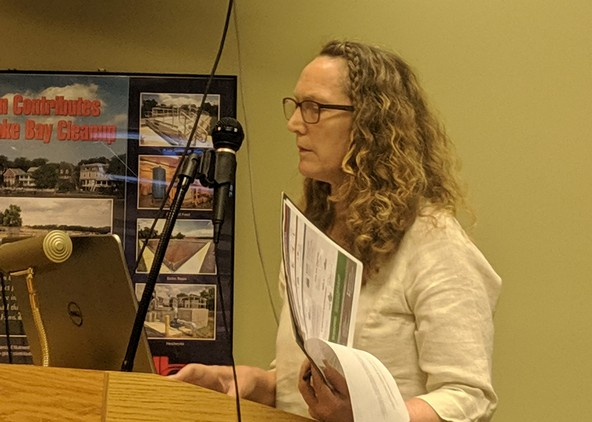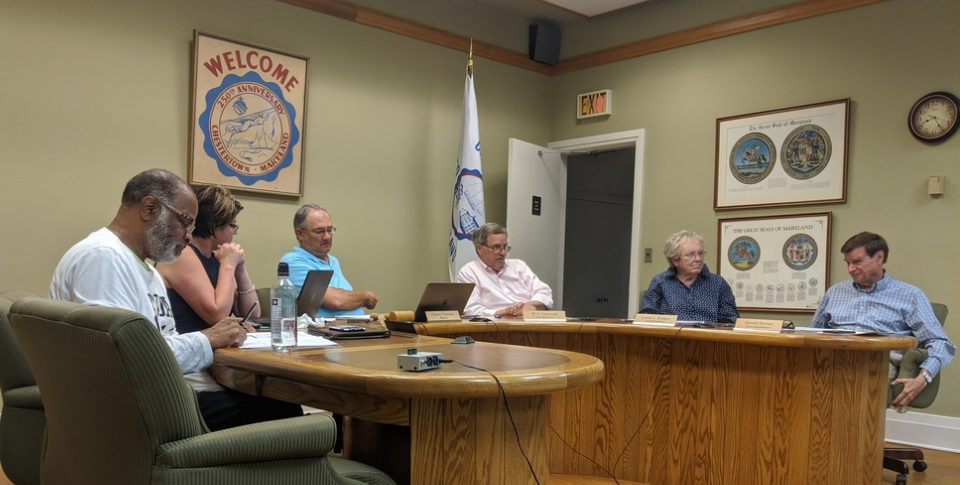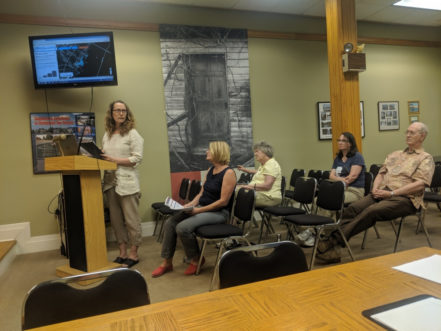
Hope Clark speaks to the Chestertown Council for the town’s Environmental Committee
The Chestertown Council, at its meeting July 1, heard a presentation by the town’s Environmental Committee about H.R. 763, the Energy Innovation and Carbon Dividend Act currently before the U.S. Congress. Hope Clark of the Citizens’ Climate Lobby, Chestertown chapter, made the presentation, outlining the possible benefits of the act and asking if the council wanted to endorse the proposed legislation.
Clark began by showing the council maps created by the Army Corps of Engineers to delineate areas of the town projected to be subject to tidal flooding over the next five to 10 years. After viewing the maps, Mayor Chris Cerino asked what the surge would be in the event of a major hurricane or tropical storm. He said the town experienced a surge 8 feet above high tide during Tropical Storm Isabel in 2003. Clark explained the color scheme, which showed a surge of more than 3 feet in purple. She asked what plans the town has for dealing with flooding.
Cerino said the town raised the parking lot of the marina between 1.5 and 3 feet in response to chronic flooding. The marina store and office were moved to the higher end of the parking lot to minimize their exposure to possible flooding. The dock at the foot of High Street is county property, and not in the town’s purview, Cerino said. Also, Wilmer Park is subject to “a lot of overwash,” and in need of attention. He said the town was working on a proposal in conjunction with Washington College to install a waterfront walkway along property extending from Wilmer Park to the Armory. He said one option might be to eliminate bulkheads and install living shorelines, as in the section of Wilmer Park near the pavilion. The challenge, he said, is that the project would be “crazy expensive,” but on the other hand, there is no critical infrastructure exposed along the riverfront in those areas.
Cerino and Town Manager Bill Ingersoll also noted that the town has made a major commitment to renewable energy by installing a 3-megawatt solar array at the town’s wastewater plant, providing essentially 100 percent of the town government’s usage. Ingersoll said the town has also contracted to buy power in 3-year blocks, with a plan to shift entirely to solar in its next contract. He said the contracts had saved the town more than $100,000 in power bills.
Clark said the Environmental Committee was asking the town to look at the bigger picture, and possibly endorse H.R. 763. She said the bill proposes a fee on the production of carbon dioxide, beginning at $15 a ton and increasing by $10 each year, as a way to encourage businesses and manufacturers to switch to renewable energy sources. The money raised would be returned directly to taxpayers, instead of going to governmental agencies. In addition, the law is expected to create in excess of 2.1 million local jobs in renewable energy and other areas. And the removal of fossil fuels from the energy mix will create a healthy environment, saving numerous lives.

The Chestertown Mayor and Council in session, July 1 — (L-R) Councilman Ellsworth Tolliver, town clerk Jen Mulligan, Mayor Chris Cerino, Town Manager Bill Ingersoll, Councilwoman Linda Kuiper, and Councilman David Foster
Councilman David Foster, who sits with the Environmental Committee, said that the latter provision makes the proposed law “close to being bipartisan” in its appeal. He said it would cost the town nothing to endorse it, and that our children and grandchildren would applaud the effort to slow climate change.
Cerino asked who, if anyone, opposes the proposed law.
Foster said that climate change deniers would be the primary opponents. He said there are “not too many” of those in Chestertown.
Clark said the proposed law has more than 50 co-sponsors in the House, and that more than 100,000 citizens have endorsed it. Also, a number of large cities have expressed their support for the measure.
Cerino said he is definitely convinced of the reality of global warming. However, he said he would need to study the proposed law more carefully. “It’s not necessarily the town’s job to endorse federal legislation,” he said. He said he was also concerned about a possible precedent, encouraging groups with all kinds of agendas – he mentioned abortion and gun rights – to lobby the town to support their positions.
Ingersoll said he worried about the funds actually reaching ordinary citizens – “Money to Washington touches too many hands to expect the same amount that goes in to come out,” he said.
Cora Dickson of the Citizens’ Climate Lobby said the town’s endorsement would be an important symbolic gesture, and that she hoped the council would do so.
Ingersoll said there was no inherent problem with the council as a whole or individual members making such an endorsement. He suggested that the committee draft a statement for the council to consider at a future meeting. Clark said she would be happy to do so.

Chestertown Utilities Manager Bob Sipes
Town Utilities Director Bob Sipes, in his monthly report, outlined several items of equipment upkeep and maintenance the department has recently had to make. He said that many pieces of equipment at the 13-year-old wastewater plant are near or past their expected lifetime. He began replacing or upgrading equipment seven years ago, he said.
Foster said he had made a note to himself to ask Sipes “what keeps you up at nights” as far as possible problems with the water and sewer systems.
Sipes said the water mains are the oldest part of the system, with some of them more than a century old. The oldest are made of rolled steel, which can’t be repaired beyond patching small holes. He said the pipes along Maple Avenue from the bridge and along Washington Avenue past the college are especially worrisome – he cited a break in one pipe 11 years ago, which crews had to dig through a foot of concrete to reach.
Also, Sipes said, the town water plant is between 80 and 90 years old, and some buildings are beginning to lean. He said they will need to be replaced within the next 20 years. He said he also needs to upgrade the restroom at the plant, which has no shower. “I’ll try to budget for that,” he said.
During ward reports, Foster said he had met with County Commissioner Ron Fithian about the possible resumption of the tax differential the county formerly paid the town for services such as police protection and street repair that the town performs out of its own budget. He said that Fithian has agreed to some kind of audit by a neutral party to determine how much the town is saving the county for such services, and that Commissioners Tom Mason and Bob Jacob have reportedly agreed as well.
Cerino said the cost savings the town supplies to the county are considerable. “It won’t be a small number,” he said.
Ingersoll said he has annual budget figures available and can supply them to whoever performs an audit.
The council also voted to appoint Rob Busler to fill a vacancy on the town’s Planning Commission, and the Rev. Charles L. Barton to a vacancy on the Historic District Commission. Both votes were unanimous.



Hope Clark says
Thank you Peter Heck for covering the Mayor and Council Town Meeting. It’s important to correct some of the information though. I’m not a member of the Chestertown Environmental Committee. I am the leader of the Citizens’ Climate Lobby Chestertown Chapter and I introduced myself as such. I represent 63 members of this nonprofit, nonpartisan, grassroots advocacy organization empowering people to exercise their personal and political power. We are laser focused on this specific piece of legislation and a proven strategy to gain the passage of a Carbon Fee and Dividend, the climate change solution economists and climate scientists alike say is the “best first-step” to preventing the worst impacts of a warming world.
I presented the bipartisan bill, HR 763 to the Chestertown Environmental Committee to endorse the Energy Innovation and Carbon Dividend Act of 2019 and they recommended I present it to the Mayor and Council with their recommendation for the Town to endorse. Republican Representative Francis Rooney of the 19th district of Florida with Democrat Representative Ted Deutch of the 22nd district of Florida introduced the bill on January 24th of 2019. They represent coastal areas like ours, and they with 50 other Representatives are stepping up to protect their citizens. What is notable about this bipartisan bill is that when it was presented in the Ways and Means Committee hearing last May, it was the first climate change legislation that had been brought before them in 12 years. Is it a strategy that both Republicans and Democrats can support.
Yes! HR 763 puts a price on pollution by imposing a fee on the carbon content of fuels, including crude oil, natural gas, coal, or any other product derived from those fuels that will be used so as to emit greenhouse gases into the atmosphere. The incremental growing fee is imposed on the producers of the fuel to encourage market-driven innovation of clean energy technologies to reduce greenhouse gas emissions. These funds are collected into a Carbon Dividend Trust Fund and are distributed evenly on a monthly basis to folks who have a valid Social Security number or taxpayer identification number. These funds are distributed similarly to the way a tax refund is distributed, to offset the incrementally rising prices of fossil fuels. This policy is projected to reduce CO2 emissions in our atmosphere by 40% in the first 12 years and 90% by 2050. We as a town and a region can support this legislation. Our Federal Representatives need to know that our changing climate concerns us. We are aware of how it is affecting us and will affect us and we want them to act.
Cora Dickson says
Small correction – I am a member of the CCL Chestertown Chapter, not the Environmental Committee.
Hope Clark says
Another clarification. The FloodIQ map which was shown at the beginning of our presentation show shows frequent tidal flood levels, the highest annual tidal flood, and flood levels if a hurricane hits and distinguishes different levels by category. It does not show surge levels. According to the book; Wiley Pathways Introduction to Emergency Management By Michael K. Lindell, Carla Prater, Ronald W. Perry, storm surges are an increased height of a body of water that exceeds the normal tide. This is mostly because of the storm wind pushing the water towards the coast.